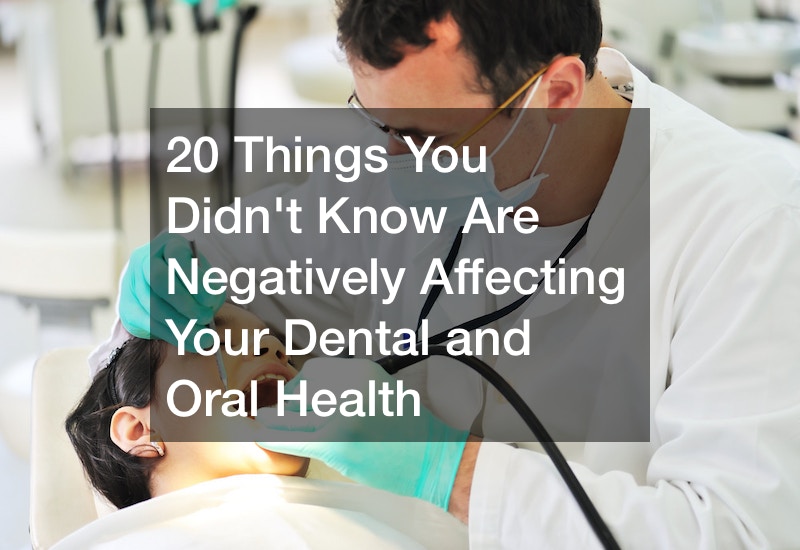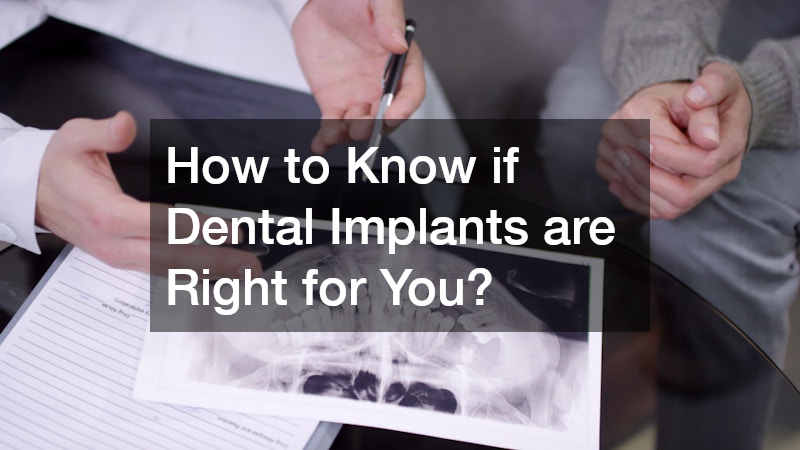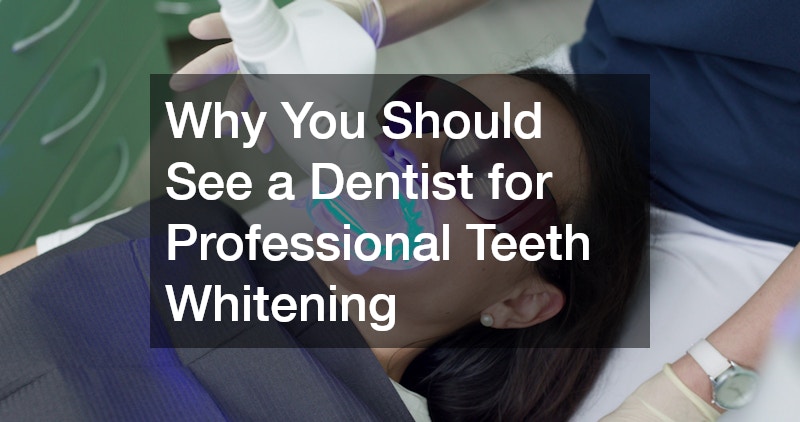
Maintaining good dental and oral health is more than just brushing and flossing daily; it involves a holistic approach to lifestyle choices and habits. Many factors, some quite surprising, can negatively affect your dental health. In this article, we will delve into twenty such factors that you might not have considered.
1. Skipping Regular Dentist Visits
Visiting your dentist regularly for check-ups and cleanings is crucial for maintaining optimal dental health. During these visits, your dentist can detect problems early and provide necessary interventions. Skipping these appointments can lead to undetected issues, such as cavities or gum disease, which can worsen over time.
Moreover, a professional dental cleaning appointment is more thorough than your daily home care routine. Your dentist can remove hardened plaque or tartar that you can’t eliminate with regular brushing and flossing. This can prevent the onset of gum diseases, keeping your smile healthy and bright.
2. Ignoring Mental Health
Often overlooked, mental health plays a significant role in dental health. Conditions like anxiety and depression can lead to poor oral hygiene habits, neglect of dental care, or harmful behaviors like teeth grinding. Therefore, seeking a psychiatric examination is essential for overall wellness, including dental health.
Furthermore, stress can cause mouth sores, and dry mouth, and increase the risk of gum disease. You can indirectly improve your dental health by managing stress and maintaining good mental health.
3. Hormonal Changes
Hormonal changes can significantly impact dental and oral health, particularly in women. Fluctuations during puberty, pregnancy, and menopause can increase the risk of gum disease and other oral health issues. That’s why understanding your body and considering local hormone replacement treatment, if necessary, is crucial.
Hormone replacement treatment can help balance hormonal fluctuations, reducing the risk of oral health problems. However, discussing these options with your healthcare provider to understand the benefits and potential risks is important.
4. Neglecting Spinal Health

The connection between spinal health and dental health might not seem obvious, but they are surprisingly intertwined. Misalignments in your spine, especially in the neck region, can lead to muscle imbalances in the jaw, causing issues like Temporomandibular Joint Disorder (TMJ).
Visiting a chiropractor regularly can help maintain good spinal health, indirectly affecting your dental health. A chiropractor can correct spinal misalignments, relieve TMJ symptoms, and promote overall well-being.
5. Using Hard Water
Hard water is characterized by elevated minerals such as calcium and magnesium. While these minerals aren’t harmful to health, they can build up on your teeth over time, leading to discoloration. Additionally, hard water is often less effective at rinsing away toothpaste and may leave a film on your teeth.
To combat this issue, consider installing a water softener in your home. A water softener can reduce your water’s mineral content, helping keep your teeth clean and bright.
6. Neglecting Home Maintenance
It might seem unrelated, but neglecting home maintenance tasks like cleaning your heat exchanger can indirectly impact your dental and oral health. A dirty heat exchanger can circulate dust and other pollutants throughout your home, which you can inhale. This can cause dry mouth, increasing tooth decay and gum disease risk.
So, don’t overlook the importance of regular home maintenance. Keeping your living environment clean, including your heat exchanger, can improve dental health.
7. Frequent Dining Out
Frequent visits to your favorite restaurant can harm your dental and oral health, especially if indulging in sugary or acidic foods and drinks. These can erode tooth enamel and lead to cavities.
While dining out occasionally is fine, try making healthier menu choices. Opt for dishes that are low in sugar and high in nutrients like calcium and phosphorus, which are beneficial for your teeth.
8. Cosmetic Procedures
While cosmetic procedures like lip fillers can enhance your appearance, they may also harm your dental health. For instance, lip fillers can interfere with normal mouth function, leading to dry mouth or difficulty cleaning your teeth properly.
Before considering any cosmetic procedure, discussing potential impacts on dental health with your healthcare provider is critical. They can help you understand the risks and suggest ways to mitigate them.
9. Living in a Mold-Infested Environment
Mold exposure can lead to various health issues, including problems with dental and oral health. It can cause inflammatory responses that exacerbate conditions like gum disease. Moreover, some types of mold can produce mycotoxins, which can cause mouth sores.
If you suspect you have a mold issue in your home, it’s essential to seek professional mold remediation services. Eliminating mold growth can protect your overall health and dental health.
10. Excessive Consumption of Alcohol

Excessive alcohol consumption can have numerous detrimental effects on your health, including your dental and oral health. Alcohol dries out the mouth, creating an environment conducive to bacteria growth, which can lead to tooth decay and gum disease.
Moreover, many alcoholic beverages are high in sugars and acids, which can erode tooth enamel. If you choose to drink, do so in moderation, and always follow up with proper oral hygiene practices.
11. Using Teeth as Tools
Using your teeth as a convenient tool for opening packages or bottles might seem like a quick solution when you can’t find scissors or a bottle opener. However, this habit can cause significant damage. The pressure applied when using teeth as tools can lead to cracks, chips, or tooth loss. Moreover, it can also cause injury to the soft tissues in your mouth, leading to pain and potential infections.
It’s important to remember that our teeth are designed for eating, not for handling hard objects. While incredibly strong, the enamel on your teeth isn’t indestructible and can be damaged by excessive force. To maintain good dental health, always use the proper tools to open things and save your teeth for their intended function – chewing food. Keep a bottle opener and scissors handy to resist using your teeth as tools.
12. Smoking and Tobacco Use
Smoking and tobacco use are well-known culprits for poor dental and oral health. These habits can result in a variety of oral health problems, such as tooth discoloration, gum disease, tooth loss, and, in severe cases, even oral cancer. The toxins present in tobacco products can affect the flow of saliva, leading to dry mouth and increasing the risk of cavities and infections.
Quitting smoking and tobacco use can significantly improve not only your dental health but also your overall well-being. If you’re struggling to quit, consider seeking help from healthcare professionals or support groups. Numerous resources available, including counseling, medications, and behavioral therapies, can aid in your journey toward quitting.
13. Poor Nutrition
A diet lacking essential nutrients can negatively impact dental health. Nutrients like calcium and vitamin D are crucial for maintaining strong teeth and healthy gums. A deficiency in these nutrients can lead to weakened enamel and an increased risk of gum disease.
Incorporating various nutrient-rich foods into your diet is a practical approach to improving your oral health. Foods like fruits, vegetables, lean proteins, and dairy products are rich in essential vitamins and minerals that support dental health. A balanced diet will benefit your overall health and play a vital role in maintaining your dental health.
14. Overuse of Whitening Products
While everyone desires a bright, white smile, overusing whitening products can do more harm than good. These products often contain harsh chemicals that can weaken tooth enamel and cause sensitivity. Over time, excessive use of these products can lead to the erosion of the enamel, exposing the dentin layer, which could lead to pain and increased susceptibility to cavities.
If you’re keen on whitening your teeth, it’s best to seek professional advice and treatment from your dentist. They can provide safe and effective options for achieving a brighter smile. They can also monitor the process to ensure whitening agents don’t harm your teeth and gums.
15. Neglecting Tongue Cleaning
Many people neglect to clean their tongues during their daily oral hygiene routine, contributing to poor dental and oral health. The tongue harbors bacteria and food particles, leading to bad breath and other oral health issues. Over time, this bacterial buildup can lead to a coating on the tongue, contributing to bad breath and potentially leading to other oral health issues.
Incorporating tongue cleaning into your daily routine is an easy way to improve oral health. You can do this either with a toothbrush or a tongue scraper. Regularly cleaning your tongue can significantly improve your dental health by reducing bacterial load, improving breath freshness, and contributing to overall oral hygiene.
16. Not Drinking Enough Water
Staying hydrated is essential for good dental and oral health. Water acts as a natural cleanser, helping to wash away food particles and bacteria that can lead to plaque formation and tooth decay. It also promotes healthy saliva production, which is vital in maintaining oral health as it contains enzymes that aid digestion and protect our teeth from bacteria.
Moreover, drinking water, especially fluoridated water, can help strengthen your teeth. The fluoride in the water can help remineralize the enamel, keeping your teeth strong and resistant to decay. To keep your mouth clean, drink water throughout the day, particularly after meals. This simple habit can do wonders for your dental health, improving overall mouth freshness and reducing the risk of cavities and gum disease.
17. Grinding or Clenching Teeth
Grinding or clenching your teeth, often due to stress or while sleeping, can cause significant damage to your dental and oral health. This habit, known as bruxism, can lead to worn-down enamel, tooth sensitivity, and even tooth breakage. Over time, consistent grinding can also lead to jaw pain and temporomandibular joint disorder (TMJ).
If you know this habit, talking to your dentist about solutions is crucial. They may recommend wearing a custom mouthguard during sleep or other treatments to protect your teeth. Additionally, incorporating stress-reducing activities into your daily routine, such as yoga or meditation, can help reduce teeth grinding.
18. Using a Hard-Bristled Toothbrush
While it might seem like a hard-bristled toothbrush would clean your teeth more effectively, it can harm your dental health. Hard bristles can be too abrasive, wearing down tooth enamel, causing gum recession, and exposing sensitive root surfaces. This can lead to increased tooth sensitivity and a higher risk of decay.
Opt for a soft-bristled toothbrush, which can effectively clean your teeth without causing damage. Remember to replace your toothbrush every three to four months or sooner if the bristles become frayed. Also, brush gently and use the proper technique to ensure you’re cleaning your teeth effectively without causing harm.
19. Consuming Too Much Caffeine
It is advisable to limit your caffeine intake and remember to rinse your mouth with water after consuming caffeinated beverages. This simple practice can greatly contribute to maintaining good dental health. Additionally, it is important to note that using an old and worn-out toothbrush is ineffective in properly cleaning your teeth.
Over time, toothbrush bristles can become frayed and serve as a breeding ground for bacteria, harming your dental and oral health. Therefore, it is essential to replace your toothbrush regularly to ensure optimal oral hygiene.
20. Not Replacing Your Toothbrush Regularly

Using an old, worn-out toothbrush is ineffective and potentially harmful to your dental and oral health. Over time, the bristles of a toothbrush can become frayed and harbor bacteria, compromising the quality of your teeth cleaning routine.
Replacing your toothbrush every three to four months or even sooner if the bristles show signs of wear is highly recommended. By doing so, you ensure that you consistently and effectively maintain your teeth’ cleanliness with each brush. Your dental health will thank you!
Final Thoughts
Taking care of your dental health is essential for your overall well-being. By being mindful of these often overlooked factors, you can improve your dental health and prevent future issues. Remember to incorporate proper oral hygiene practices into your daily routine, make healthy lifestyle choices, and seek professional help when needed. You can enjoy a bright, healthy smile for years with regular care and attention.


